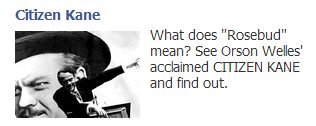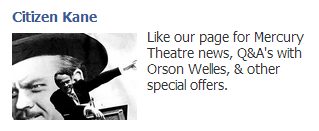This is my Facebook “Fanpage” makeup/breakdown (i.e the demographics) of my “likes”:
Tag: Facebook
Forward! Facebook Advertising
By Rob Millis
Facebook ads are perhaps the most targeted promotional tool available to filmmakers on a limited budget. Instead of tying your ads to search terms, Facebook advertising enables targeting based on location, particular interests, even employer.
Let’s say you’re promoting a documentary film about the Boston Marathon. Instead of spending money to reach a million people interested in “running” (who may not really care about marathons), you can focus ads more accurately by reaching people who have expressed clear interest in specific races like Bay to Breakers or the Boston Marathon, as well as those who have indicated that they are training for a marathon.
By Reid Rosefelt
One of the most stunning achievements of the Internet is the speediness with which it can spread misinformation, stupidity and lies. There have been dummies since the dawn of time, but they have previously lacked the technology to unleash the virus of their brainlessness to untold millions with the swiftness and ease we enjoy today. There is no way that so many seemingly sentient people could believe that the President of the United States wasn’t born in the U.S. if it wasn’t for the power of the web. Even as big a blowhard as Donald Trump would not to be able to accomplish this without the Internet.
And now we have Graph Search. As I wrote last week, Graph Search has the potential to do enormous good, but quickly I realized that it would also be another force for the triumph of stupidity in the modern world.
As I was turning in my blog copy, a guy named Tom Scott put up a Tumblr blog, “Actual Facebook Graph Searches,” which quickly went viral. Scott searched things like married people who like Prostitutes, current employers of people who like Racism, and more disturbingly, family members of people who live in China and like Falun Gong and Islamic men interested in men who live in Tehran, Iran. Gizmodo also found people who announced on Facebook their liking for “Shitting my pants,” and Mashable used Graph Search to suggest that People Who Like Honey Boo Boo Like Playing Dragon City, Musicians like to play Tetris Battle, Apple Employees listen to David Guetta, Google employees listen to Pink Floyd, and Mashable readers like “Inception.”
IMPORTANT NOTE:
As I was finishing my recent post on Facebook’s Graph Search, Tom Scott’s Tumblr blog on Facebook’s new Graph Search feature, “Actual Facebook Graph Searches,” went viral. Scott searched things like others of Jews who like Bacon, married people who like Prostitutes, and current employers of people who like Racism, and more disturbingly, family members of people who live in China and like Falun Gong, and Islamic men interested in men who live in Tehran, Iran. It’s likely that some of these “likes” were intended to be ironic. I’m doubtful that that people would say they liked Prostitutes, even if they did, andGizmodo found people with dubious likes for “Shitting my pants,” as well as some creepy things that might not be ironic. But as has been noted a lot, it would be hard for people in China to say they were joking about liking the Falun Gong.
I advise all of you to go to “3 Privacy Changes You Must Change Before Using Facebook Graph Search” (Gizmodo) and Facebook Graph Search: Now Is The Time to Go Over Your Privacy Settings (ABC News). I also think it would be worth studying The Facebook Privacy information page.
Last Tuesday, Facebook introduced a new feature called Graph Search at a highly hyped press conference. Wall Street, which had been expecting a phone ,was not impressed, and the stock dived by 6.5% (it’s since recovered). On the other hand, the social media bloggers almost unanimously called Graph Search a triumph and Mashable declared: “Facebook Graph Search Could Be Its Greatest Innovation.”
What is it? Graph Search gives you the power to tap into the web of connections between you and your friends in a way that has never existed before. For example, if you type in a question like “Which of my friends like Moonrise Kingdom?” you will be shown a list of your friends, weighted by the ones you interact with the most, i.e., best friends on top. You could also ask, “What films do my friends like?” and presumably–I haven’t seen it yet–the films at the top of the list will be the ones most liked by your friends. You can also add other variables to your search like “Which of my female Los Angeles friends who speak French like Moonrise Kingdom?”
Imagine if he sought out the most talented, but not yet established, filmmakers in this country–the stars of the film schools, people, festival prize-winners, critically acclaimed directors whose movies have not turned a profit. He invites each of these people to his office in California, where he takes them for a nature walk to explain his dream of a colossal experiment in cinematic collaboration, larger than anything the world has previously seen. Not incidentally, he offers each of them a substantial salary to take part. Most will grab the money or be curious; others will be suspicious of his motives or wary of being tied up and say no. It will take awhile to put together the perfect group, but the entrepreneur is patient and won’t quit until he’s assembled hundreds of people, the best of the best of the best. Of course, sometimes he’ll make the wrong choices, but one thing he’s known for is his decisiveness about letting people go when necessary.

Let’s begin by taking off the table the fact that many people really hate them. Assuming that that’s not the case, usually the 100 pixel x 72 pixel size is too small to even show the poster image, and the maximum 90 characters makes a tweet look like a novel. It’s true that Facebook ads can be dirt cheap– for the price of one weekly ad in IndieWire– I once got 60 million “impressions” (times displayed) on Facebook– and it offers prodigious targeting abilities allowing you to zero in on fans of any director, actor, movie, social issue, among other  things, but still, you end up with a bargain price on a zillion itsy-bitsy ads that I personally don’t think will directly lead to anything as big as a ticket purchase or a video viewing. Selling shoes or an exercise program or ice cream cones, yes; movie tix, no. In my opinion, the sole purpose of those itsy-bitsy teeny-weenie ads on the right side of the page is to drive people to like your Facebook page. It’s worked for me and countless others and it can work for you (if you do it right).
things, but still, you end up with a bargain price on a zillion itsy-bitsy ads that I personally don’t think will directly lead to anything as big as a ticket purchase or a video viewing. Selling shoes or an exercise program or ice cream cones, yes; movie tix, no. In my opinion, the sole purpose of those itsy-bitsy teeny-weenie ads on the right side of the page is to drive people to like your Facebook page. It’s worked for me and countless others and it can work for you (if you do it right).
Following My Own Advice
By Reid Rosefelt
had breakfast recently with Jaie LaPlante, the Executive Director of the Miami International Film Festival. Jaie has healthy 13,000 fans on his Facebook page, but like most people, he’s hungry for more.
I explained that he shouldn’t worry much too much about the number of fans–the thing that matters is how active his page is–he should be concerned with the number of likes, comments and shares. What was he doing to stir up traffic? Jaie said he had a guy named Igor Shteyrenberg who was merrily posting all day long. “He shouldn’t posting so often,” I said, repeating a truisms I’d rattled off so often in blogs and lectures. “All Facebook research has proven that you should never post more than two or three times a day.”
Umm….wrong. Rules don’t apply when you have great content.
Despite–or maybe because of–the constant postings, I later discovered that Miami had one of the liveliest festival pages I’d ever seen. Igor turned out to be the George Takei of movies,


